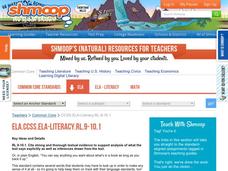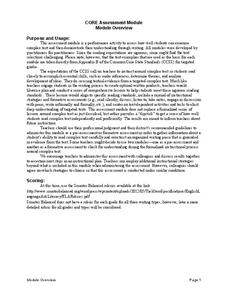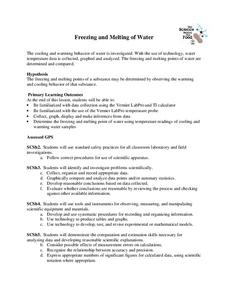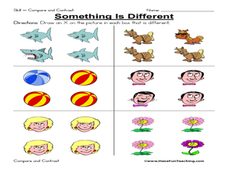Have Fun Teaching
Growing Seeds (9)
A seed, water, and sunlight. A seed, water, but no sunlight. A seed, sunlight, but no water. Young biologists are ask to infer what will happen to seeds given five different growing conditions.
Curated OER
You Make the Call: Practicing Predictions
In this worksheet on making predictions, students read 4 short scenarios that end with a question about what might happen next, then answer the question lines provided.
Curated OER
An Indecent Chicken?
In this inference learning exercise, students read a passage and write a conclusion about what they read and match vocabulary words with definitions. Students complete 11 problems.
Curated OER
Social Studies Strategies - Pick a Word
In this inference skills worksheet, students read a short passage, then pick two words that describe the passage. Next they explain why they chose that word. Students choose another word related to the passage and write it on a 3x5 note...
Towson University
Looking Backwards, Looking Forward
How do scientists know what Earth's climate was like millions of years ago? Young environmental scholars discover how researchers used proxy data to determine the conditions present before written record. Grouped pupils gain experience...
PBS
Does Art Imitate Life?
Write what you know, sound advice for any writer and something many famous authors are known to have done. Use these materials to explore how Shakespeare's life influenced his plays. This resource is packed with readings, video segments,...
Curated OER
Maniac Magee: Questions to Foster Discussion
This resource provides 11 short answer questions and a couple of extension ideas related to part one of Jerry Spinelli's novel about a feisty runaway. Not reproducible, but the questions (which address vocabulary, inference, recall,...
UAF Geophysical Institute
Carbon Footprint
Your young environmentalists can calculate their carbon footprint and discuss ways to reduce it with a worksheet about climate change. After reading a handout about what impact one's carbon footprint can have on the environment, kids...
Shmoop
ELA.CCSS.ELA-Literacy.RL.9-10.1
Does your ELA class need some practice with the specific skills outlined in the Common Core standards? Then this is the perfect resource for you! One in a series of connected lessons that cover the standards for reading literature,...
California Education Partners
Women
Alice Walker's poem "Women" provides ninth graders the opportunity to demonstrate their ability to identify how a writer's choice of syntax and diction contribute to the development of the theme of the work.
Curated OER
Word Roots 2: Fin, Sed, Fer Intermediate-Word Search
Make learning Latin roots a game! After you have introduced the roots fin, sed, and fer, learners can use this word search to build their vocabulary. (Within the word search are words containing these roots.) You can further the activity...
Curated OER
Literature-based Skill Building: Holes by Louis Sachar
In this reading skills learning exercise, students complete several literature-based skill building activities for the book 'Holes' by Louis Sachar.
Curated OER
Space Food
What do astronauts eat in outer space? Kids can read an informational passage to learn about space food. The passage includes prompts that have learners identify the main idea and key details, then write a paragraph summarizing the text....
Curated OER
Today’s Telephone
Does your class know the history behind today's telephone? They will after reading a very interesting one-page informational passage. They'll learn all about the way phones have progressed to the amazing devices they've become as they...
Shmoop
ELA.CCSS.ELA-Literacy.RL.11-12.1
All the Common Core standards are important, but they all build off the ability to cite textual evidence to support analysis. See how to scaffold this standard into three steps of development, along with assessment ideas with the ideas...
UAF Geophysical Institute
System Interactions: The Lorax and the Truffula Tree
If the Lorax were to write a letter, what would he write? Introduce your class to systems and feedback loops through the whimsical stylings of Dr. Seuss. Learners take on the Lorax's point of view to write a letter, among other activities.
Inside Mathematics
House Prices
Mortgages, payments, and wages correlate with each other. The short assessment presents scatter plots for young mathematicians to interpret. Class members interpret the scatter plots of price versus payment and wage versus payment for...
Royal Society of Chemistry
Mass Changes in Chemical Reactions—Microscale Chemistry
What better way is there to introduce conservation of mass than a few simple experiments? Young chemists conduct two chemical reactions, take the masses of reactants and products, then compare their results to determine...
Curated OER
How HIV Infects Cells
In this how HIV infects cells worksheet, students read the given information about how HIV infects cells. Students explain the role of various structures in HIV infection. Students design a drug that might slow the rate of cellular...
It's About Time
Where are the Volcanoes?
Middle school geologists map the volcanoes closest to themselves, learn about map distortion, and infer possible future volcano locations. A focus on latitude, longitude, and volcanoes beneath the ocean helps connect the lesson.
University of Georgia
Freezing and Melting of Water
Examine the behavior of energy as water freezes and melts. An engaging activity provides a hands-on experience to learners. Collaborative groups collect data and analyze the graphs of the temperature of water as it freezes and then...
Curated OER
Literature-based Skill Building: Holes by Louis Sachar (Chapter 39)
In this literature response worksheet, students answer 20 short essay questions about Chapters 39-44 of the book Holes by Louis Sachar.
KERA
Matisse and Picasso
Discover Modernism through the eyes of artists. Over the course of six well-thought-out lessons, learners examine works by Pablo Picasso and Henri Matisse while completing a range of collaborative and hands-on activities. A great resource!
Curated OER
Something is Different: Same/Different
In this different/same worksheet, student draw an X on the picture in a box that is different from the others, 6 sets total. A reference web site is given for additional activities.

























